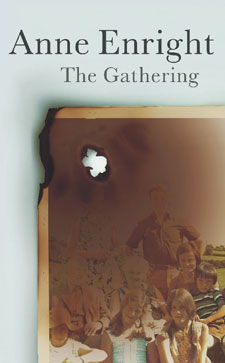“I would like to write down what happened in my grandmother's house the summer I was eight or nine, but I am not sure if it really did happen. I need to bear witness to an uncertain event. I feel it roaring inside me " this thing that may not have taken place.” (p1)
So opens The Gathering, a book described by reviewers as "exhilaratingly bleak', and on 16 October named as this year's winner of the prestigious Man Booker Prize for Fiction.
 Written by Irish author Anne Enright, The Gathering is the non-chronological, literary recollections and imaginings (often we are not sure which) of Veronica Hegarty, the seventh of twelve children in a nominally Roman Catholic Irish family.
Written by Irish author Anne Enright, The Gathering is the non-chronological, literary recollections and imaginings (often we are not sure which) of Veronica Hegarty, the seventh of twelve children in a nominally Roman Catholic Irish family.
Veronica's fictional testimony ranges over four generations of the Hegarty family " a family diluted by size, and poisoned by its past. Consciously and unconsciously, she bears witness to the interconnectedness of things, particularly two events relating to her brother Liam " something that happened to Liam as a child and, many years later, his suicide.
As both the funeral party and Veronica's thoughts start to gather, we (the reader) try to reassemble the disassembled. And the family is, individually and corporately, disassembled!
Says Veronica: "It is not that the Hegartys don't know what they want, it is that they don't know how to want. Something about their wanting went catastrophically astray.' (p 187) She recalls that Liam "had strong ideas about justice, but he was unkind to every single person who tried to love him; mostly, and especially, to every woman he ever slept with, and still, after a lifetime of spreading the hurt around, he managed to blame me.' (p 168)
Veronica's self-analysis borders on self-detachment. "I thought about this, as I sat in the Shelbourne bar " that I was living my life in inverted commas. I could pick up my keys and go "home' where I could "have sex' with my "husband' just like lots of other people did. This is what I had been doing for years. And I didn't seem to mind the inverted commas, or even notice that I was living in them, until my brother died." (p 181)
Running through the book, perhaps unsurprisingly, is an undercurrent of sexual abuse. Occasionally it surfaces, but is usually left unsaid or unknown. On page 224 Veronica lists the "the things I do, actually know' " one event. She then says, "These are the things I don't know" " a list significantly greater in number follows.
Like most recent Booker winners, The Gathering is not feel-good fiction. Enright, herself, admits that "when people pick up a book they may want something that will cheer them up, in that case they shouldn't really pick up my book".
It is a book of ideas and crafted phrases " literary rather than page-turning, although mysteries surrounding the past (what happened to Liam " and Veronica), and the future (what will Veronica do) do draw us forward.
The nominal Roman Catholicism is presented, but not despised. "Of course Mammy is a Catholic, in the way that Mammys are, but for fourteen years or so I sat by or behind my father on a wooden church bench, every Sunday morning and in all that time I never saw his lips move. I never heard him pray aloud, or saw him bend his head, or do anything that might be considered remarkable were he sitting on the top deck of a bus." (p 227)
The children toe the line. "All the Hegarty babies are baptised, because to do otherwise would be to rob this woman (Veronica's mother) of what she rightfully owns, her little treasure of souls " we all traipse dutifully up to the front and hand them over." (p 183)
But all this religious ritual is manifestly ineffectual. "I try to believe in something, just for the heck of it. I pluck some absolute out of the air, some expanding thought that will open in my head like ether " God, or the future, or the greater good." (p 228)
Whilst The Gathering is good writing and addresses important themes, this review of this book is not necessarily a recommendation to read it. Though not overdone, there are descriptive passages in this book that some will find offensive. A book addressing sexual abuse and its consequences could hardly be otherwise. Potential readers will also need to decide whether they want to interact with these themes.
It can be helpful to be aware of what is taking place on the cutting-edge of fiction (or any other area of culture for that matter). The Booker Prize will ensure that The Gathering receives significant sales and worldwide recognition. It is what people will be reading.
Tellingly, near the end, Veronica describes herself: "There I am, sitting on a church bench in my own meat: pawed, used, loved, and very lonely." (p 244) One wonders how many people sitting in our churches could say the same thing.
Stephen Liggins, a former editor with Anglican Media, is assistant minister at St Stephen's, Penrith.






















